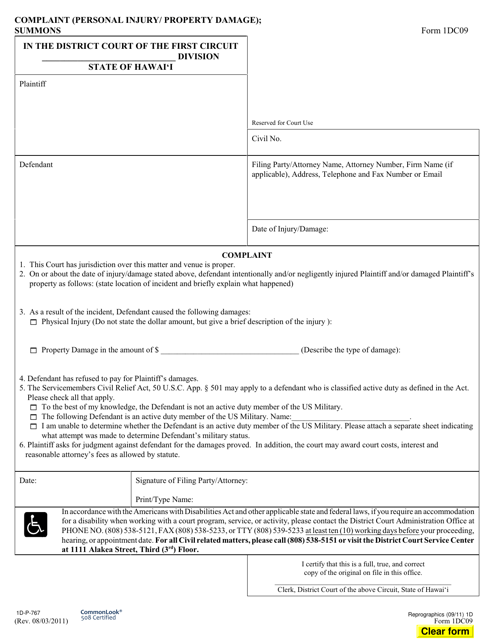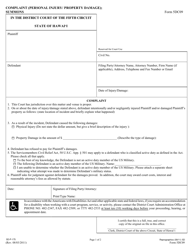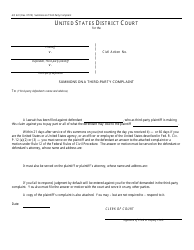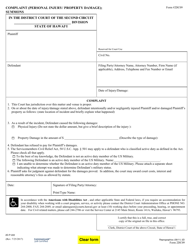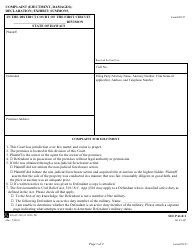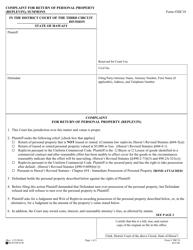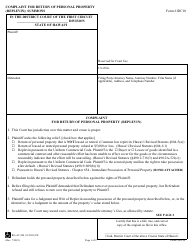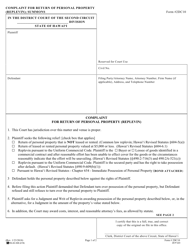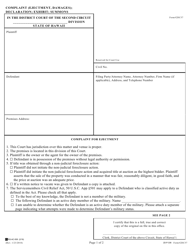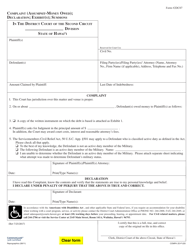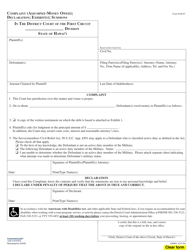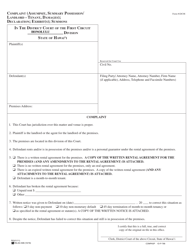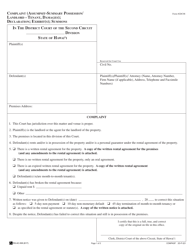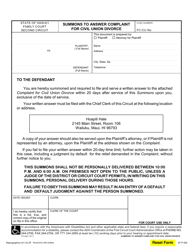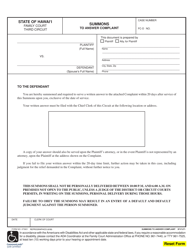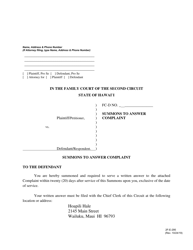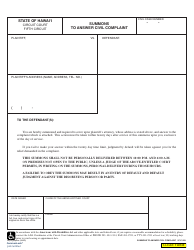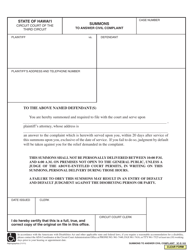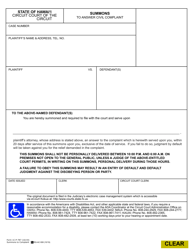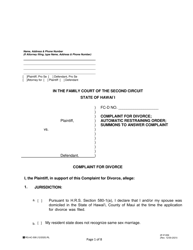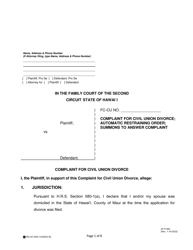This version of the form is not currently in use and is provided for reference only. Download this version of
Form 1DC09
for the current year.
Form 1DC09 Complaint (Personal Injury / Property Damage); Summons - Hawaii
What Is Form 1DC09?
This is a legal form that was released by the Hawaii District Courts - a government authority operating within Hawaii. As of today, no separate filing guidelines for the form are provided by the issuing department.
FAQ
Q: What is Form 1DC09?
A: Form 1DC09 is a complaint form for personal injury or property damage in Hawaii.
Q: What is a complaint?
A: A complaint is a legal document that states the claims and allegations in a court case.
Q: What is personal injury?
A: Personal injury refers to physical or psychological harm caused to a person.
Q: What is property damage?
A: Property damage refers to harm or destruction caused to someone's property.
Q: What is a summons?
A: A summons is an official notice issued by a court to inform a person that a legal action has been filed against them.
Q: Who should fill out Form 1DC09?
A: The person who suffered personal injury or property damage should fill out Form 1DC09.
Q: What should I include in Form 1DC09?
A: You should provide details about the incident, the parties involved, and the damages claimed in Form 1DC09.
Q: What should I do after filling out Form 1DC09?
A: After filling out Form 1DC09, you need to file it with the court and serve a copy to the defendant.
Q: Do I need a lawyer to fill out Form 1DC09?
A: Legal representation is recommended, but you can fill out Form 1DC09 without a lawyer if you understand the process.
Q: What happens after filing Form 1DC09?
A: After filing Form 1DC09, the court will review the complaint and may schedule a hearing or request additional information.
Q: What is the deadline to file Form 1DC09?
A: The deadline to file Form 1DC09 depends on the statute of limitations for personal injury or property damage cases in Hawaii.
Q: Can I use Form 1DC09 for other types of cases?
A: Form 1DC09 is specifically for personal injury or property damage cases; you may need a different form for other types of cases.
Q: Can I modify Form 1DC09?
A: You should consult with a legal professional before making any modifications to Form 1DC09.
Q: What should I do if I need help filling out Form 1DC09?
A: If you need help filling out Form 1DC09, you should consider consulting with a lawyer or seeking assistance from legal aid organizations.
Q: Is there a fee to file Form 1DC09?
A: There may be filing fees associated with Form 1DC09; you should check with the court clerk for the current fee schedule.
Q: What should I do if I receive a summons?
A: If you receive a summons, you should consult with a lawyer immediately to understand your legal rights and options.
Q: What should I bring when filing Form 1DC09?
A: When filing Form 1DC09, you should bring the completed form, any supporting documents, and the necessary filing fee.
Q: What is the purpose of Form 1DC09?
A: Form 1DC09 is used to initiate a legal action for personal injury or property damage in Hawaii.
Q: How long does it take for the court to process Form 1DC09?
A: The processing time for Form 1DC09 varies depending on the court's workload and other factors.
Q: What is the statute of limitations for personal injury or property damage cases in Hawaii?
A: The statute of limitations for personal injury or property damage cases in Hawaii is typically two or three years, depending on the specifics of the case.
Q: What if I miss the deadline to file Form 1DC09?
A: If you miss the deadline to file Form 1DC09, you may lose your right to pursue your personal injury or property damage case.
Q: Can I represent myself in a personal injury or property damage case?
A: While it's possible to represent yourself in a personal injury or property damage case, it is generally recommended to seek legal representation for better outcomes.
Q: What should I do if I cannot afford a lawyer?
A: If you cannot afford a lawyer, you may be eligible for free or low-cost legal services provided by legal aid organizations.
Q: What is the role of the defendant in a case filed with Form 1DC09?
A: The defendant is the person against whom the claims are being made, and their role is to respond to the complaint and present their defense.
Q: What if the defendant fails to respond to Form 1DC09?
A: If the defendant fails to respond to Form 1DC09, a default judgment may be entered in favor of the plaintiff.
Q: Can I settle the case after filing Form 1DC09?
A: Yes, you can reach a settlement with the defendant at any stage of the legal process, including after filing Form 1DC09.
Q: What if the defendant denies the claims in Form 1DC09?
A: If the defendant denies the claims in Form 1DC09, the case may proceed to trial or alternative dispute resolution.
Q: What types of damages can be claimed in Form 1DC09?
A: You can claim various types of damages in Form 1DC09, including medical expenses, property repairs, lost wages, and pain and suffering.
Q: Can I add more claims or parties after filing Form 1DC09?
A: After filing Form 1DC09, you may need to seek court permission to add more claims or parties to the case.
Q: What if I need to dismiss the case after filing Form 1DC09?
A: If you need to dismiss the case after filing Form 1DC09, you may need to submit a request for dismissal to the court.
Q: What are the next steps after filing Form 1DC09?
A: The next steps after filing Form 1DC09 may include discovery, negotiation, motion hearings, and ultimately, trial or settlement.
Q: Can I appeal the court's decision based on Form 1DC09?
A: If you disagree with the court's decision based on Form 1DC09, you may have the right to appeal to a higher court.
Q: What should I do if I receive a response to Form 1DC09?
A: If you receive a response to Form 1DC09, you should review it carefully and consult with a lawyer to plan your next steps.
Q: What should I do if I have more questions about Form 1DC09?
A: If you have more questions about Form 1DC09, you should contact the court clerk's office or seek legal advice from a professional.
Form Details:
- Released on August 3, 2011;
- The latest edition provided by the Hawaii District Courts;
- Easy to use and ready to print;
- Quick to customize;
- Compatible with most PDF-viewing applications;
- Fill out the form in our online filing application.
Download a fillable version of Form 1DC09 by clicking the link below or browse more documents and templates provided by the Hawaii District Courts.
